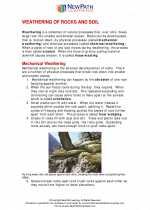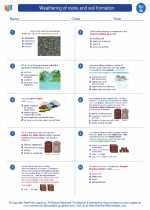Weathering of rocks and soil formation -> minerals
Minerals
Minerals are naturally occurring inorganic substances with a definite chemical composition and a crystalline structure. They are the building blocks of rocks and are essential to the functioning of the Earth's crust. Minerals have a wide range of physical and chemical properties that make them valuable for various industrial, commercial, and scientific purposes.
Physical Properties of Minerals
- Color: The color of a mineral can vary due to impurities present in its structure.
- Luster: It is the way light reflects from the surface of the mineral. It can be metallic, glassy, pearly, or dull.
- Hardness: This refers to the resistance of a mineral to scratching. It is measured using the Mohs scale, which ranges from 1 (softest, talc) to 10 (hardest, diamond).
- Cleavage and Fracture: Cleavage is the way a mineral breaks along planes of weakness, producing flat, shiny surfaces. Fracture is the way a mineral breaks when it does not exhibit cleavage.
- Crystal Form: Minerals can form specific geometric shapes called crystals. These shapes are determined by the internal arrangement of atoms within the mineral.
Chemical Composition of Minerals
Minerals are composed of chemical elements in specific proportions. They can be classified into groups based on their chemical composition, such as oxides, sulfides, carbonates, silicates, and more.
Formation of Minerals
Minerals are formed through various geological processes such as crystallization from magma, precipitation from solution, and metamorphism. The conditions under which minerals form greatly influence their physical and chemical properties.
Uses of Minerals
Minerals have numerous practical applications in everyday life. They are used in construction (e.g., granite, limestone), technology (e.g., quartz in electronics), jewelry (e.g., diamonds, gold), and many other industries.
Studying Minerals
To study minerals, it is important to understand their physical and chemical properties, as well as their formation processes. It involves fieldwork to identify and collect mineral samples, laboratory analysis using tools like microscopes and spectrometers, and theoretical studies to understand the geological processes that lead to mineral formation.
Understanding minerals is crucial to fields such as geology, environmental science, and materials science, and it provides insights into the Earth's history and processes.
[Minerals] Related Worksheets and Study Guides:
.◂Science Worksheets and Study Guides Seventh Grade. Weathering of rocks and soil formation

 Activity Lesson
Activity Lesson
 Worksheet/Answer key
Worksheet/Answer key
 Worksheet/Answer key
Worksheet/Answer key
 Worksheet/Answer key
Worksheet/Answer key
 Worksheet/Answer key
Worksheet/Answer key
 Vocabulary/Answer key
Vocabulary/Answer key
 Vocabulary/Answer key
Vocabulary/Answer key
 Vocabulary/Answer key
Vocabulary/Answer key
 Vocabulary/Answer key
Vocabulary/Answer key
